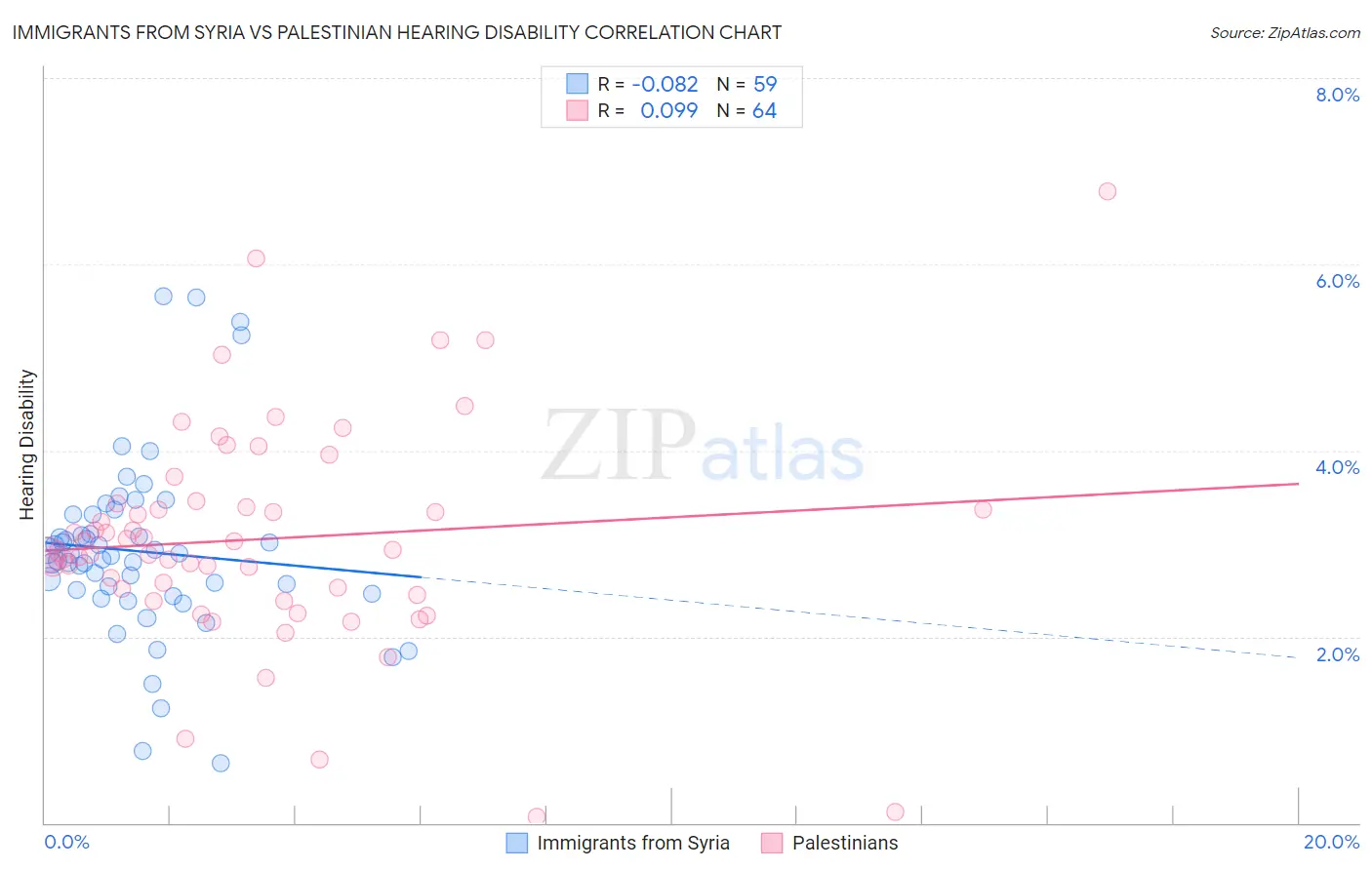Immigrants from Syria vs Palestinian Hearing Disability
COMPARE
Immigrants from Syria
Palestinian
Hearing Disability
Hearing Disability Comparison
Immigrants from Syria
Palestinians
2.9%
HEARING DISABILITY
85.8/ 100
METRIC RATING
133rd/ 347
METRIC RANK
2.9%
HEARING DISABILITY
73.6/ 100
METRIC RATING
150th/ 347
METRIC RANK
Immigrants from Syria vs Palestinian Hearing Disability Correlation Chart
The statistical analysis conducted on geographies consisting of 174,100,459 people shows a slight negative correlation between the proportion of Immigrants from Syria and percentage of population with hearing disability in the United States with a correlation coefficient (R) of -0.082 and weighted average of 2.9%. Similarly, the statistical analysis conducted on geographies consisting of 216,454,064 people shows a slight positive correlation between the proportion of Palestinians and percentage of population with hearing disability in the United States with a correlation coefficient (R) of 0.099 and weighted average of 2.9%, a difference of 1.9%.

Hearing Disability Correlation Summary
| Measurement | Immigrants from Syria | Palestinian |
| Minimum | 0.64% | 0.070% |
| Maximum | 5.7% | 6.8% |
| Range | 5.0% | 6.7% |
| Mean | 2.9% | 3.0% |
| Median | 2.9% | 2.9% |
| Interquartile 25% (IQ1) | 2.5% | 2.5% |
| Interquartile 75% (IQ3) | 3.3% | 3.4% |
| Interquartile Range (IQR) | 0.85% | 0.93% |
| Standard Deviation (Sample) | 0.97% | 1.2% |
| Standard Deviation (Population) | 0.96% | 1.2% |
Demographics Similar to Immigrants from Syria and Palestinians by Hearing Disability
In terms of hearing disability, the demographic groups most similar to Immigrants from Syria are Chilean (2.9%, a difference of 0.0%), Immigrants from Kenya (2.9%, a difference of 0.060%), Ugandan (2.9%, a difference of 0.070%), Soviet Union (2.9%, a difference of 0.21%), and Immigrants from Brazil (2.9%, a difference of 0.24%). Similarly, the demographic groups most similar to Palestinians are Immigrants from France (2.9%, a difference of 0.060%), Immigrants from Panama (2.9%, a difference of 0.42%), Immigrants from Russia (2.9%, a difference of 0.54%), Tongan (2.9%, a difference of 0.67%), and Brazilian (2.9%, a difference of 0.69%).
| Demographics | Rating | Rank | Hearing Disability |
| Immigrants | Kenya | 86.1 /100 | #131 | Excellent 2.9% |
| Chileans | 85.8 /100 | #132 | Excellent 2.9% |
| Immigrants | Syria | 85.8 /100 | #133 | Excellent 2.9% |
| Ugandans | 85.5 /100 | #134 | Excellent 2.9% |
| Soviet Union | 84.8 /100 | #135 | Excellent 2.9% |
| Immigrants | Brazil | 84.6 /100 | #136 | Excellent 2.9% |
| Sri Lankans | 84.1 /100 | #137 | Excellent 2.9% |
| Immigrants | Costa Rica | 84.0 /100 | #138 | Excellent 2.9% |
| Bermudans | 83.8 /100 | #139 | Excellent 2.9% |
| Immigrants | Jordan | 83.7 /100 | #140 | Excellent 2.9% |
| Sub-Saharan Africans | 83.3 /100 | #141 | Excellent 2.9% |
| Laotians | 81.1 /100 | #142 | Excellent 2.9% |
| Immigrants | Bahamas | 80.9 /100 | #143 | Excellent 2.9% |
| Immigrants | Bulgaria | 79.2 /100 | #144 | Good 2.9% |
| Immigrants | Congo | 78.9 /100 | #145 | Good 2.9% |
| Brazilians | 78.7 /100 | #146 | Good 2.9% |
| Tongans | 78.6 /100 | #147 | Good 2.9% |
| Immigrants | Russia | 77.7 /100 | #148 | Good 2.9% |
| Immigrants | Panama | 76.9 /100 | #149 | Good 2.9% |
| Palestinians | 73.6 /100 | #150 | Good 2.9% |
| Immigrants | France | 73.1 /100 | #151 | Good 2.9% |